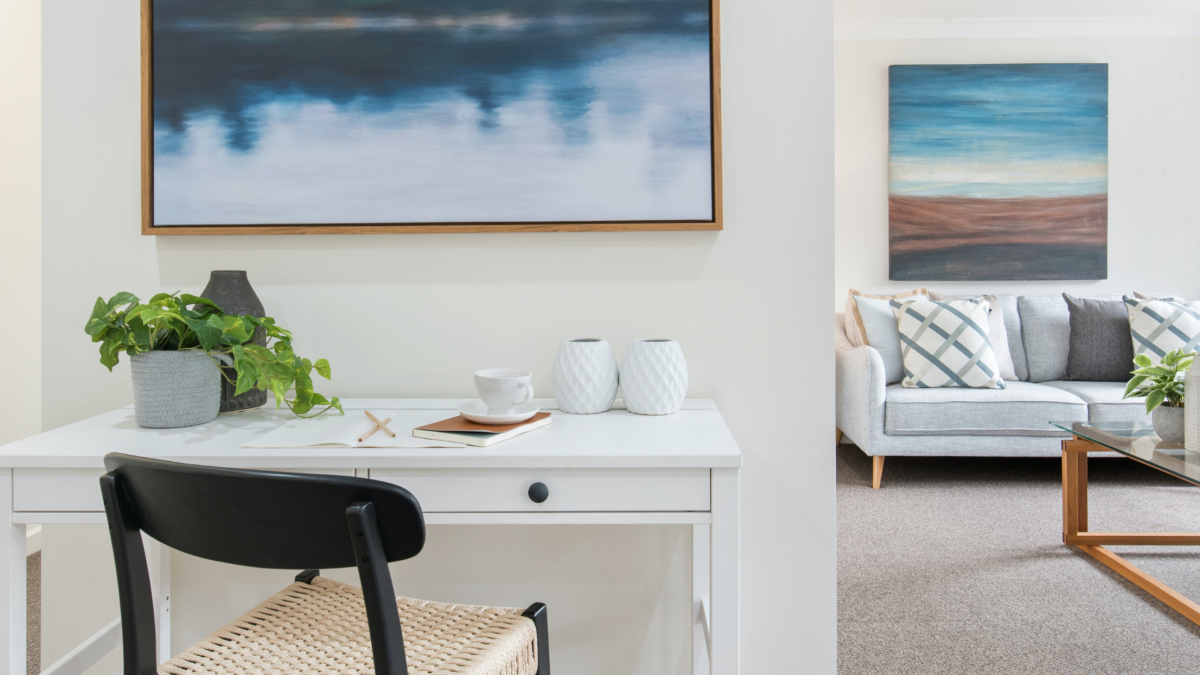One thing that remains consistent with student housing across the globe is that space is usually at a premium. If you’re renting at the more economical end of the spectrum, chances are you’ll be working with a smaller space. But there are ways to make that space work for you, whether making use of nooks in a room that might be going to waste or creating the illusion of a larger space through colour and layout. Here are some tips to maximise your rental space, without the need to upsize your property.
Make use of storage anywhere you can
Storage is the obvious solution to any rental property, but you really need to think outside the box when it comes to a small space. Avoid using large free-standing pieces – they might seem like a good way to keep your belongings organised, but they can make a small room feel more crowded and they’re bulky. Look at areas of your property where you can sneak in added storage to free up space, such as under the stairs, beneath your bed or adding shelving above door frames. Adding storage vertically and maximising wall space is also a great way to utilise an area of a room that typically goes to waste.
Go light and bright
You might be surprised just how much of a difference the right colour scheme can make to a property. When you’re aiming to maximise space, the trick is to go lighter and brighter, to create the illusion of a bigger room. Opt for decorative and smart lighting tricks with different coloured bulbs. Or, experiment with 3D printing ideas to create stylish desktop lamps and inspiring tinted bulbs, as Tata Rossi, a professional photographer explains, “creative bulbs can be done in different colours and shapes, allowing you to show off your creativity and create unique lighting for any room”.
Most landlords will be open to you painting a property if it’s a neutral colour, so speak with them to see what you’re allowed to do, and opt for clean neutrals such as white or tinted creams that will bring more light into the room. And, don’t neglect the floor; it’s a large part of a room and can work wonders to enhance that illusion of the room being larger than it is. Instead of carpet, why not choose vinyl flooring that reflects light and is easier to maintain too, as an added bonus.
Consider your placement of furniture
The placement of furniture and your belongings goes a long way to maximising a rental property’s capacity, and you might be surprised how you can redesign a space to create a functional and aesthetically-pleasing home. By rearranging your furniture, you may find that it opens up new opportunities for storage or simply how you use the space on a day-to-day basis. For example, maybe you pull the sofa out from the wall so you can fit a tall bookshelf behind it that can act as storage for books, DVDs and ornaments. Or maybe you can replace a coffee table with side tables at the ends of the sofa that will free up floor space without losing the functionality of somewhere to put your drinks or phone.
Create zones
Partitioning a room, particularly if you’re renting a studio flat, can be a great way of feeling as though you have more rooms than you have and can help to create a cosy yet functional space. You can split your room into a sleeping area and a space to work on your coursework, for example, or maybe you have an open plan living and kitchen area. In this case, separate the two sections with a moveable partition that adds interest to the property but also offers privacy without taking away too much of that all-important space.
Think multipurpose
If you can find items that do double duty, it will help you to make better use of your available space. Just because a flat or house is on the smaller side, doesn’t mean you have to get compact furniture to fill it. In fact, small spaces can appear even smaller if it’s cluttered with numerous small items. Instead, try to prioritise the items you really need and think about ways you can have those items serve multiple purposes. For example, can you swap out your dining table for a foldable alternative that can double up as a place to eat and work? Or maybe you can change up a regular bookshelf for one with a fold-out desk that provides storage and a workspace in one.
Declutter
Finally, the less you have to fit into your student rental, the easier it will be to maximise your space. There are always things we hold onto that tend to sit in cupboards or on shelves for months without us using them, whether it’s books we haven’t read, DVDs we’ve not watched in years or clothes that don’t fit anymore. So if you’re on the move to a new rental, take the opportunity to have a declutter and think about what you really need to keep and what can be passed on to someone else or donated. You might be surprised once you take a look at your belongings just how much you’re finding room for that you don’t need to.
Make the most of hidden opportunities
There are endless possibilities when it comes to a small space, and you don’t have to assume that your interior decor options are non-existent just because your home is on the smaller side. Making the most of your own space will help settle in especially if you’re sharing a student house with good friends and you want to live together harmoniously! In fact, with a bit of creativity, illusion, DIY know-how and considering places in the property that might otherwise be ignored, you can utilise every inch of the property and also create the sense of a bigger property.


